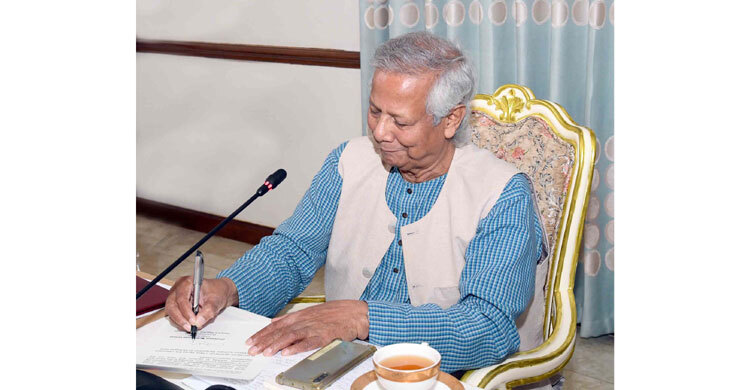Bangladesh signs UN treaty on enforced disappearances

Bangladesh formally acceded to the International Convention for the Protection of All Persons from Enforced Disappearances on Thursday.
The signing, led by Chief Adviser Professor Muhammad Yunus, took place during the interim government's weekly advisory council meeting and was met with applause from council members.
At that time Dr Yunus said, “This is a historical event.”
The timing of the signing is significant, occurring just one day before the International Day of the Victims of Enforced Disappearances, said the press wing of the Chief Adviser.
Earlier this week, the interim government also established a commission to investigate cases of enforced disappearances that occurred during Sheikh Hasina's 15-year rule.
As the convention is overseen by the UN Human Rights Council, the UN Secretary-General will forward Bangladesh's accession letter to the Office of the United Nations High Commissioner for Human Rights (OHCHR) for further action.
According to the rights organisation Odhikar, more than 700 people have been victims of enforced disappearances over the last 15 years, with over 150 still missing.
The International Convention for the Protection of All Persons from Enforced Disappearance (ICPPED) was adopted by the UN General Assembly in 2006 and came into force in December 2010.
Initially endorsed by 32 countries, the convention now has 75 signatories. Its goals are to prevent enforced disappearances, combat impunity, and ensure victims' rights to justice and reparation.
With this signing, Bangladesh has now joined eight out of nine UN human rights conventions. The UN had long urged Bangladesh to join the convention, but previous governments had refrained from doing so. The interim government's decision to sign the treaty reflects its commitment to ending the culture of enforced disappearances in the country.
According to sources within the foreign ministry, two inter-ministerial meetings were held last week to discuss the signing of the convention. The decision to join was finalized during these meetings, and the treaty will now undergo vetting by the law ministry before being officially adopted by the advisory council. Bangladesh aims to submit its letter of accession to the UN before August 30, with plans to sign other related agreements in the future.
By joining the convention, Bangladesh opens the door for the UN to hold the government or any state agency accountable for state-sponsored enforced disappearances.



